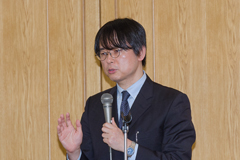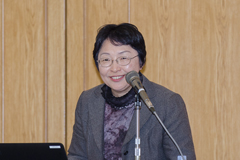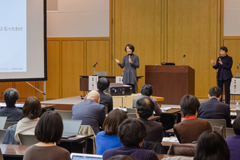JICA-RI Visiting Fellow Kuroda Explains the Effectiveness of Inclusive Education for Improving the Quality of Education at a Seminar
2017.03.29
JICA Research Institute Visiting Fellow Kazuo Kuroda (and professor at Graduate School of Asia Pacific Studies, Waseda University), lead researcher on the JICA-RI research project "Disability and Education," and his colleagues gave a presentation on the findings of research related to the education of children with disabilities in developing countries at a seminar held on February 27, 2017 at the JICA Ichigaya Building. Kuroda explained "inclusive education is effective at improving the quality of education," and observed that the ideal approach to education known as "no one left behind" differs by country and society.
Inclusive education is a process that involves the transformation of schools and other centers of learning to cater for all children – including boys and girls, students from ethnic and linguistic minorities, rural populations, those affected by HIV and AIDS, and those with disabilities and difficulties in learning and to provide learning opportunities for all youth and adults as well, as defined by UNESCO in 2009.
JICA has continuously held a series of seminars to discuss inclusive education with members who are engaged in social welfare and basic education. This was held as the ninth seminar with the theme of “Education: No one left behind”. Participants shared the results of the research project and its case studies in Japan to consider future aid to developing countries.
In the first session entitled "The Current State of Education of Children with Disabilities in Developing Countries," Kuroda explained there has been little research on the number as well as the causes of children with disabilities not attending school in developing countries. He then reported the results of his interview surveys of the parents and teachers who have children with and without disabilities in Cambodia and Mongolia to determine the relevant factors involved in not attending school. He found that the parents of children with disabilities not attending school believed, in addition to disabilities, the causes included a lack of facilities and access to schools.
Kuroda also pointed out that inclusive education has a positive impact on the improvement of academic abilities, emotional development and self-esteem in children with and without disabilities in each country, as shown by empirical research. He presented about how the interview surveys in Cambodia and Mongolia also indicated most parents and teachers recognized studying together led to an improvement in academic abilities and social skills of both children with and without disabilities. Kuroda explained that although inclusive education is usually discussed from the perspective of ensuring the fairness and equity of education, the results suggest it is also effective in improving the quality of education.

JICA-RI Visiting Fellow Kazuo Kuroda
Miki Sugimura, a professor in the Department of Education in the Faculty of Human Sciences at Sophia University, gave a presentation on "The Ideal Nature of Inclusive Education in Developing Countries." She conducted an investigation in Nepal on the same research project.
According to Sugimura, although Nepal has been rolling out inclusive education across the country, there are many factors hindering school attendance, such as disparities between urban and rural areas, diverse languages and religions, gender gaps and castes. She pointed out that in a diverse society such as Nepal, the word "inclusion" (social inclusion, leave no one behind) also has diverse meanings, so the term should be considered in accordance with the individual societal context. Sugimura introduced a case in which children with and without disabilities grew up learning together through education conducted in collaboration between normal schools and special-needs programs, and the example of a bakery cafe employing people with disabilities. As "a choice that does not choose inclusive education," she also introduced the words of a teacher at a school for the deaf, who said "although castes are a barrier in normal classrooms, a school for the deaf has a unique world of sign language, transcending castes."

Miki Sugimura, a professor of Sophia University
In the second session of the Seminar, Yasuko Kimura spoke on the theme "How Ozora Elementary School Became a 'School for Everyone.'" Kimura is the former principal of Ozora Elementary School, Sumiyoshi Ward in Osaka, which was the set for the film "School for Everyone." Reflecting on the school’s efforts, Kimura related specific episodes, explaining "inclusive is not about having or not having disabilities. It means the ability for all children in a community to live in their own unique way."

Participants listen to a presenter
Interview: “Inclusive education will improve the quality of education,” with Kazuo Kuroda, JICA-RI
(YouTube:JICA Research Institute Official Channel)

事業事前評価表(地球規模課題対応国際科学技術協力(SATREPS)).国際協力機構 地球環境部 . 防災第一チーム. 1.案件名.国 名: フィリピン共和国.

事業事前評価表(地球規模課題対応国際科学技術協力(SATREPS)).国際協力機構 地球環境部 . 防災第一チーム. 1.案件名.国 名: フィリピン共和国.

事業事前評価表(地球規模課題対応国際科学技術協力(SATREPS)).国際協力機構 地球環境部 . 防災第一チーム. 1.案件名.国 名: フィリピン共和国.

事業事前評価表(地球規模課題対応国際科学技術協力(SATREPS)).国際協力機構 地球環境部 . 防災第一チーム. 1.案件名.国 名: フィリピン共和国.

事業事前評価表(地球規模課題対応国際科学技術協力(SATREPS)).国際協力機構 地球環境部 . 防災第一チーム. 1.案件名.国 名: フィリピン共和国.
scroll